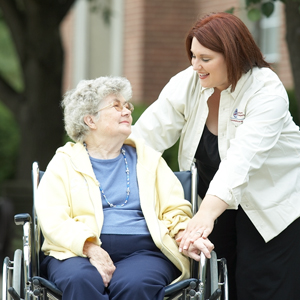Managing Urinary Incontinence
As seniors age, many things come into play — safety in the home and out, health conditions seniors face, the emotional ups and downs when dealing with the normal aging process, including the loss of loved ones.

Urinary incontinence is an issue that more than half of seniors deal with, and it can affect a senior’s health, social connections and self-esteem. Managing incontinence is critical for seniors that want to maintain their independence and quality of life while remaining in their home.
While incontinence is a highly prevalent issue, it’s important to remember that incontinence is treatable, and a physician can make recommendations based on the type of incontinence they diagnose.
Why Does Incontinence Happen?
During urination, muscles in the bladder tighten to move urine into a tube called the urethra, while the muscles around the urethra relax and let the urine pass out of the body. When the muscles in and around the bladder don’t work properly, urine can leak. Incontinence can occur for short periods of time due to urinary tract infections, constipation, or as a side effect of a medication.
How is Incontinence Diagnosed and Treated?
Depending on the severity of the problem, a doctor may recommend any or all of the following:
- A urinalysis to rule out infection or blood in the urine
- Blood tests to check on kidney function, calcium and glucose levels
- A complete physical exam and thorough discussion of one's medical history
- Medicine that calms muscles and nerves to treat an overactive bladder.
- Exercises to strengthen the pelvic muscles
- If other treatments fail, surgery may be suggested to improve bladder control.
How Can Incontinence be Managed at Home?
There are a few lifestyle changes that can help manage incontinence:
- Pelvic muscle exercises: Working the muscles that can stop urination can have a positive effect in reducing incontinence.
- Timed bathroom breaks: Going to the restroom on a schedule can help those with urge and overflow incontinence.
- Fluid and diet management: Avoid food and drinks that irritate the bladder. It’s important for seniors to discuss their diet and fluid intake with the doctor before making any changes.
- Behavioral changes: There are some habits that can make incontinence worse. These include smoking, drinking alcohol, lifting objects that are too heavy and consuming caffeine, among others.
Comfort Keepers®Can Help
If your loved one has specific care needs related to a health issue, like incontinence, we can help. Our caregivers can provide transportation to appointments, medication reminders, support for physician-recommended diet and exercise programs, and help monitor physical changes and symptoms. And, we strive to elevate the human spirit through quality, compassionate, joyful care.
To learn more about our in-home care services, contact your local Comfort Keepers location today.
References
Mayo Clinic. “Urinary Incontinence: Diagnosis.” Web. 2019.
National Institute on Aging. “Urinary Incontinence in Older Adults.” Web. 2017.
WebMD. “Urinary Incontinence: Foods and Drinks that Make you Gotta Go.” Web. 2017.
Sign up to receive helpful info right to your inbox.
We understand choosing an in-home care provider can be a difficult decision, and we want to make your journey as easy as possible. We're here to support you by providing helpful senior care tips and information on in-home care and senior health and wellbeing topics.
Start a Job with a Purpose
Uplifting training and support for you every step of the way.
Apply to be a caregiver







